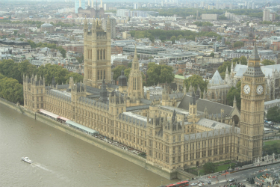 The idea that the internet would be at the heart of the modern economy is so old it went out of fashion when it was still cool to walk around in a shell suit smoking a massive cigar.
The idea that the internet would be at the heart of the modern economy is so old it went out of fashion when it was still cool to walk around in a shell suit smoking a massive cigar.
Yet across Government, digital policy remains fragmented and un-coordinated, as the high-speed broadband roll-out snakes through the European courts, post-Digital Economy Act unravelling makes a badger cull look relatively straightforward and woe betide anyone who lives in a rural area trying to get a decent 3G signal, let alone broadband.?
In the East, Singapore and South Korea have more active mobile broadband subscriptions than people. In Britain, we have taken more than six years to auction 4G spectrum.
While Finland made broadband access a legal right in February 2010 our own efforts to ensure
widespread high-speed access has been a catalogue of concerns, with the state-aid and monopoly issues of BDUK spending tied into the on-going debate about infrastructure spending in times of austerity (that said, I?d happily wager that ?32bn on digital infrastructure and access would have a much greater impact than HighSpeed2 getting you to Birmingham 15 minutes quicker).
Across departments, contradictory and increasingly un-coordinated policy risks undermining
business confidence and consumer choice, further undermining the market for high-speed access and the reputation of Britain as a place to do business. This needs sorting out, and the only way to do it is for a minister with direct, unequivocal responsibility for the internet.
Let?s consider the landscape.
 The Home Office is currently arguing why the details of every citizen?s emails, website visits and
The Home Office is currently arguing why the details of every citizen?s emails, website visits and
social media messages should be logged, while the Foreign Office tells foreign governments in the developing world that they should absolutely not be doing so.?
Meanwhile the Department for Work and Pensions has based the business case for Universal Credit on 80% of the transactions for being done online, when YouGov polling shows that 41% of online respondents would be less likely less likely to use online websites and services if the Communications Data bill was passed.
In response to that draft Bill, the Minister responsible for Universities and Science in BIS was also responsible for assessing the impact on the British economy, while the Foreign Office has taken an internationally lauded lead on cyber security, only for the Cyber Security minister to sit in the Cabinet Office.
At the Department for Education, they?re considering a ?default block? on adult content after a
Mary Whitehouse 2.0 campaign led by religious groups citing an anecdotal survey as academic
research, following on from last year?s riots, when Chinese state media praised discussion of shutting down Twitter by the Prime Minister and several high-profile MPs, saying ?the open discussion of containment of the Internet in Britain has given rise to a new opportunity for the whole world.?
Never ones to miss out on an opportunity, the Home Office have also drawn up a list of websites under the ?Prevent? strategy that they want blocking too. Of course, the issue of even blocking content should in no way be linked to Lord Leveson?s consideration of statutory press regulation, at a time when online news services are beginning to make business models work without any requirement for printed products and information circulates quicker than a tray of warm wine at a conference.
 This ?blocking? issue is nothing new, Commercial issues are of course paramount, so courts have added their own two-penneth, handing down blocking orders for Newzbin2 and the Pirate Bay that appear to have driven up traffic to the sites concerned.?
This ?blocking? issue is nothing new, Commercial issues are of course paramount, so courts have added their own two-penneth, handing down blocking orders for Newzbin2 and the Pirate Bay that appear to have driven up traffic to the sites concerned.?
Unfortunately, these issues were woefully handled in the Digital Economy Act ? a piece of legislation so critical it should never, ever have been allowed into the wash-up prior to the 2010 Election - and since then the situation has arguably worsened, with the uncertainty surrounding a Communications Green Paper that had already taken on a mythical quality when the Minister responsible explained the delay by saying ?we said it would be published before the Olympics, but never said which Olympics?.
That same department is responsible for the Broadband Delivery UK (BDUK) project, which has
managed to create an almost perfect monopoly while at the same time failing to create regulation of high-speed broadband access. When concerns around the dodgy costs presented surfaced, DCMS did the honourable thing and sacked the person they thought had leaked details of just how much the taxpayer was getting fleeced for.
It isn?t just about ministerial decisions, but the wider need to get a grip of the broader policy
direction. In recent months we?ve seen the police and courts jettison the inconvenience of
proving ?incitement?, who have decided that in the absence of actual crime to investigate it is a
suitable use of time and resource to arrest idiots making idiotic remarks on Facebook and Twitter.
Across the public estate leadership and expertise is badly lacking, leading to a dangerously
fragmented range of policies that threaten the evolution of Britain as a digital society. The internet must not be something added onto Ministerial job descriptions as an afterthought ? it is far more important than that.
Now is the time for the whole Government to work together, led by a minister whose sole objective is to harnessing the next industrial revolution for the benefit of future generations.
Source: http://www.broadbandgenie.co.uk/blog/20121105-opinion-we-need-an-internet-minister-now
neighborhood watch dennis rodman dodgers sale tami roman jetblue captain los angeles dodgers christie brinkley
No comments:
Post a Comment
Note: Only a member of this blog may post a comment.